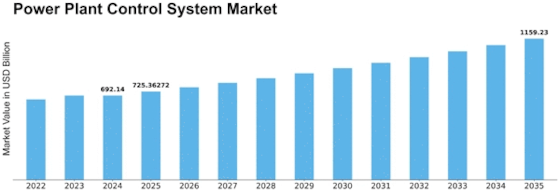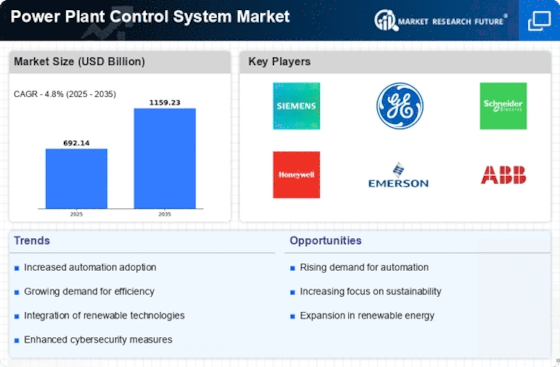Power Plant Control System Size
Power Plant Control System Market Growth Projections and Opportunities
The Power Plant Control System Market is influenced by several market factors that play a pivotal role in shaping its dynamics. One of the primary factors is the global energy demand, which continues to rise as economies grow and modernize. As societies seek cleaner and more sustainable energy sources, power plants are undergoing transformations, driving the demand for advanced control systems. The increasing focus on environmental sustainability and the need to comply with stringent regulations regarding emissions also contribute to the market's growth. Governments worldwide are implementing policies to encourage the adoption of cleaner technologies, thereby fostering the expansion of the power plant control system market.
Technological advancements represent another crucial factor in this market. The integration of digital technologies, such as the Industrial Internet of Things (IIoT), artificial intelligence, and machine learning, has revolutionized power plant control systems. These innovations enhance the efficiency, reliability, and overall performance of power plants. The demand for sophisticated control systems that can monitor, analyze, and optimize plant operations in real-time is on the rise. As a result, market players are continually investing in research and development to stay competitive and meet the evolving technological needs of the industry.
Economic factors also exert a significant impact on the power plant control system market. Investments in power generation infrastructure, both in developing and developed countries, influence the demand for control systems. Economic growth, industrialization, and the expansion of urban areas drive the need for reliable and scalable power solutions. Additionally, the cost of energy production and the overall operational efficiency of power plants are critical considerations for end-users. Therefore, the power plant control system market is closely tied to economic indicators and the financial health of the industries it serves.
The regulatory landscape plays a vital role in shaping the power plant control system market. Governments worldwide are implementing stringent regulations to address environmental concerns, reduce carbon emissions, and promote sustainable energy practices. Compliance with these regulations necessitates the adoption of advanced control systems that can optimize plant processes and minimize environmental impact. Companies operating in the power plant control system market must stay abreast of evolving regulatory requirements to ensure their products meet the necessary standards and certifications.
Geopolitical factors also contribute to the market's dynamics. The availability and pricing of raw materials, geopolitical tensions impacting the energy sector, and global supply chain disruptions can influence the overall cost structure and profitability of power plant control system manufacturers. Trade policies, international collaborations, and geopolitical stability play a crucial role in determining market growth and investment opportunities.
Lastly, the competitive landscape within the power plant control system market is shaped by factors such as market consolidation, mergers and acquisitions, and strategic partnerships. Companies strive to enhance their market presence, expand their product portfolios, and gain a competitive edge through collaborations. Customer preferences, brand reputation, and after-sales services are also essential factors that influence market competitiveness.
The power plant control system market is a dynamic and multifaceted industry influenced by various market factors. The interplay of global energy demand, technological advancements, economic considerations, regulatory frameworks, geopolitical dynamics, and competitive strategies collectively shape the trajectory of this market. As the energy sector continues to evolve, the power plant control system market will remain a critical component in ensuring the efficient, sustainable, and reliable operation of power plants worldwide.



















Leave a Comment